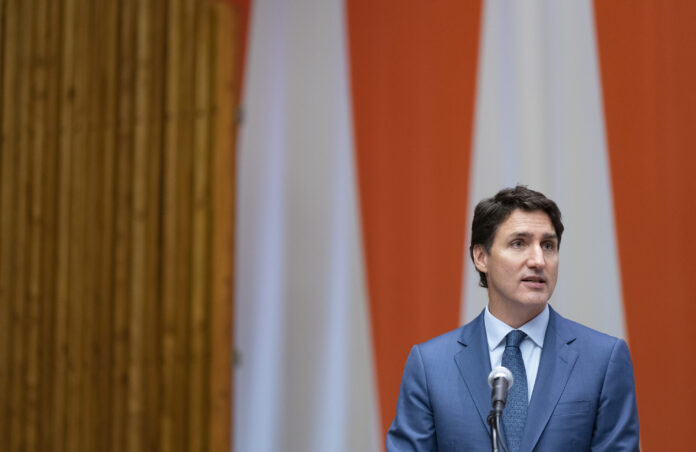|
Getting your Trinity Audio player ready...
|
Justin Trudeau’s Leadership Under Siege: Chrystia Freeland’s Resignation Signals Deepening Crisis
Edited by: Fern Sidman
Canadian Prime Minister Justin Trudeau is facing what many analysts, including The Wall Street Journal describe as a defining moment of crisis in his political career. The recent resignation of Finance Minister Chrystia Freeland has not only shaken the foundations of Trudeau’s Liberal government but also exposed deep fissures within his leadership team. According to The WSJ report, Freeland’s departure underscores growing discontent within the ruling party and a sharp divide over fiscal priorities, threatening to unravel Trudeau’s decade-long leadership.
As reported by The WSJ, Chrystia Freeland’s resignation last Monday came with a scathing critique of Trudeau’s economic policies. Freeland, who had been considered one of Trudeau’s closest allies and a key architect of the government’s fiscal strategy, stepped down citing irreconcilable differences over economic priorities. Her resignation letter, which The WSJ analyzed in detail, emphasized the need for fiscal restraint in preparation for imminent economic challenges, including the looming threat of a 25% tariff on Canadian exports proposed by U.S. President-elect Donald Trump.
“We must keep our fiscal powder dry today to prepare for a coming tariff war,” Freeland wrote, as quoted by The WSJ. This statement reflects a fundamental disagreement with Trudeau’s approach to government spending, which has drawn increasing criticism for driving deficits higher and placing significant pressure on the Canadian dollar.
According to the information in The WSJ report, Trudeau’s government has been repeatedly criticized for its handling of Canada’s economy. The country now faces soaring deficits, a currency that has plunged to just 70 U.S. cents, and consistent failures to meet NATO defense-spending commitments. Freeland’s departure, the WSJ noted, amplifies the perception of a government unable to chart a coherent economic course during a time of global uncertainty.
The fiscal policies pursued under Trudeau—characterized by high public spending, cultural leftism, and hostility towards Canada’s fossil fuel sector—have alienated large segments of the electorate, as the report in the WSJ highlighted. These policies have exacerbated economic fragility and left Canada vulnerable to external shocks, such as Trump’s proposed tariffs.
The WSJ report points to Conservative leader Pierre Poilievre as a key beneficiary of Trudeau’s spiraling popularity. Poilievre has positioned himself as a pragmatic alternative, offering a vision centered on fiscal responsibility, lower taxes, and robust support for Canada’s energy sector.
Recent polls show the Conservatives with a commanding 20-point lead over Trudeau’s Liberals, signaling a dramatic shift in public sentiment. Poilievre’s messaging, which contrasts sharply with Trudeau’s progressive policies, has resonated deeply with voters frustrated by rising living costs, economic instability, and a perceived lack of government accountability.
Freeland’s resignation, according to The WSJ report is not merely an isolated event—it is a symptom of broader dysfunction within the Liberal Party. Trudeau’s leadership style, characterized by a mix of charisma and rigidity, is now being questioned not only by voters but also by members of his own party.
The WSJ report suggested that Freeland’s departure may inspire other senior Liberal figures to distance themselves from Trudeau as they seek to salvage their political futures. However, as the publication pointed out, many of these individuals have been deeply involved in the same policies they now seek to disavow, making it difficult for them to fully escape accountability.
One of the most pressing concerns outlined by the report in the WSJ is the potential for a trade conflict with the United States under the incoming Trump administration. Trump’s proposed 25% tariff on Canadian exports threatens to further destabilize Canada’s already fragile economic position.
Freeland’s resignation, as the WSJ report emphasized, signals a lack of confidence in Trudeau’s ability to prepare Canada for such a challenge. Her call for fiscal restraint and prudent financial planning stands in stark contrast to the Trudeau administration’s continued commitment to high public spending.
Canadian public opinion is shifting decisively against Trudeau. Polls show a clear appetite for change, with many Canadians expressing frustration over the government’s inability to address key issues such as housing affordability, inflation, and energy policy.
Trudeau’s initial appeal—rooted in optimism, inclusivity, and progressive values—has been overshadowed by a series of economic missteps and a growing sense of political fatigue. As the economic and political landscape grows more uncertain, Trudeau’s leadership seems increasingly untenable.
The WSJ analysis suggested that Freeland’s resignation could mark the beginning of the end for Trudeau’s leadership. While he has managed to weather previous political storms, the combination of internal dissent, economic challenges, and a resurgent Conservative opposition may prove insurmountable.
If Trudeau chooses to step down, as The WSJ report speculates could happen, it would signal the end of an era for Canadian politics. However, his departure alone may not be enough to repair the deep divisions and economic uncertainty that currently define the country’s political landscape.
The WSJ report painted a stark picture of a government in crisis, a Prime Minister increasingly isolated, and a nation on the brink of significant political change. Chrystia Freeland’s resignation is not merely a personal decision—it is a loud and clear indictment of Trudeau’s leadership and his government’s economic strategy.
For now, all eyes are on Trudeau—and on whether he can weather this storm or if Chrystia Freeland’s departure will indeed mark the beginning of the end for his leadership.





